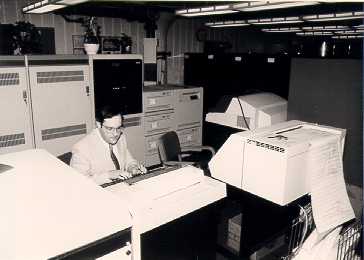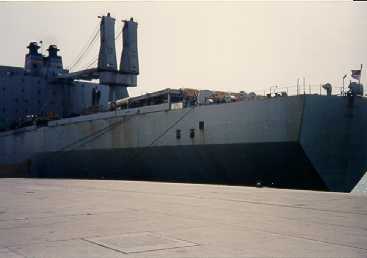
Bayonne
Perhaps I shouldn’t try to explain the intricacies of Defense Transportation, it is of almost Kabalistic complexity and could result in the average reader doubting their sanity, but I guess a few words of explanation are in order. In the military scheme of things, the Air Force runs the airplanes and air bases, the Navy runs the cargo ships, warships and Naval Bases and the Army, in the person of my then employer, the Military Traffic Management Command, runs overland transportation and cargo ports. The Army runs the ports? Yeah – go figure. Amongst the core competencies of the Military Traffic Management Command is the development of computer systems to facilitate, track and document the movement of cargo through the Defense Transportation System. One of the numerous projects I got involved with during my tenure with MTMC was a system to assist transportation planners in arranging the necessary sealift resources (ships’ capacity, port capacity, trucks, rail cars etc.) to be used when a unit has to be rapidly deployed. It was called the Automated System to Predetermine Unit Requirements, ASPUR.

Military Transportation Specialists are incredibly talented, resourceful and patient people. They plan an operation down to the "Nth" degree – and then watch their intricate plans go up in smoke when a General Officer utters two words, "I want!" Generals are, at least in their own minds, never wrong and arguing with them is not an option, therefore flexibility is the key to a transportation planner’s sanity and success. Naturally, that same flexibility needs to programmed into the computer systems the planners use, and an important reason why a programmer needs to be available make time-critical changes. Most computer systems are developed around business rules that are "engraved in stone," but when "The General" says, "I want!" the stone melts – and the programmer goes to work.
My deployment system had been given a pretty good shakeout in the years preceding the Desert Shield deployments. The Army conducts many deployment exercises, some of them are done on paper, simply to test the systems and procedures to be utilized in an actual deployment. Others however, involve actually deploying a great many troops and a good deal of equipment to overseas locations. I had participated in many of them, assigned to deployment ports in places like Savannah GA and Jacksonville FL. There I would get to meet and work closely with personnel from United States Army Reserve Units who trained for the eventuality of an actual deployment. Many of those highly professional and extremely dedicated people would be activated during the Gulf War and their performance would be flawless. I was always impressed every time I got to work with the Reserve Units assigned to MTMC, it was great to meet so many of them when I was in Saudi.
After the usual shakeouts and modifications, my system performed exactly according to specifications during these exercises. I have to admit that I was really proud of that, but the real pride came later. The largest deployment exercises usually amounted to three shiploads of equipment to Europe or Korea. Little did I know in those days, that over five hundred shiploads of equipment would be ferried to the Persian Gulf. The system was designed to "bug out" a Corps. The Persian Gulf deployment was twice that and the system performed perfectly at twice its design capacity. Remember that flexibility is the key to deployments and I designed a whole lot of flexibility into that system.
On August 2, 1990, an associate and I were planning a business trip to the Azores to tweak up a port system there. I’d been there the year before and really got to like the place. The island of Terciera in the Azores is the location of Lages field, a United States Air Force Base used as a stop over for aircraft moving on to Europe and the Middle East. Supplying the base is the Army’s job and a small Army unit is located there to manage sea cargo traffic. Perhaps the most interesting thing about the Azores is the fact that there is a small Navy there – and it’s run by the Army (didn’t I tell you this would be confusing.) It seems that the port there is a little too shallow for large containerships to pull up to a dock, so containers are offloaded onto barges and towed to the dock. The tugs and lighters are manned by Army Personnel. I hope I’m not divulging a military secret here, because I’ve got to think that if the Navy actually knew that the Army was operating watercraft, they would have put up a pretty big "stink" by now. The average Admiral would choke on his cigar smoke at the idea of a green-suited Army Warrant Officer mastering a working vessel.
Anyway, somewhere in the midst of preparing for the Azores adventure, I remember hearing about the invasion of Kuwait. It meant nothing to me, less than nothing actually, my reaction was something on the order of, "Let them kill each other." As I mentioned earlier, prejudice will enter this story, I’m not proud of it and I’ve worked very hard in the years since the Gulf War to overcome it, but it was there and has to be addressed. Today, it is my fervent and genuine desire that the descendents of Isaac and Ishmael, who are born of the same father and who, in their own way, worship his G-d, should one day live together as brothers in their ancestral homes. Unfortunately, that concept remains a pipe dream both today and in 1990 when I began to realize…
I am a Jew. In all honesty, I don’t ever remember even thinking those words before the Gulf War. Don’t get me wrong, I wasn't one of those non-religions "cultural" Jews. I observed in the Conservadox tradition, always went to Synagogue on Sabbaths and Holidays and kept a Kosher home. But before the war, all of that was mechanical, and I gave it about as much thought as brushing my teeth. I visited Israel once in 1971, found it interesting historically, but didn’t develop an emotional connection with the land or people and never had a desire to return. I still don’t. I did however, have a political interest in the Mid-East and naturally sided with my "own people." So in 1990, being Jewish meant not liking Arabs or their supporters and owning the most efficient car I could so that I’d use the least possible amount of Arab oil. Oil was really on my mind in those days, I hated the fact that my gas money was being used to finance Arab Terrorism in Israel and elsewhere. Therefore, when I heard that one Oil Sheik in Iraq invaded another in Kuwait, I was obviously less than concerned.
Well, my attitude changed pretty rapidly when it became apparent we had to honor a treaty which would commit the military might of the United States to protecting Saudi Arabia from Iraqi invasion. Anti-Semites for generation have always harped on the myth of Dual-Loyalty, that Jews could not be fully loyal to any host country for whatever perverse reasons these Jew-haters could concoct. The fact was, that despite my lack of concern as to which Oil Sheikdom invaded which, and my deep opposition to shedding one drop of American blood to protect an Arab country, there was never a moment of hesitation about doing the job for which I had prepared for so long.
We geared up rapidly. All over the East Coast of the United States, special deployment ports opened up and cargo from the Eighteenth Airborne Corps, whose mission it was to protect Saudi Arabia, began to flow into the ports. The summer of 1990 was brutal for the Reservists and the civilian augmentees who sweated in the heat and humidity in places like Beaumont, Texas, Savannah, Georgia and Moorehead City, North Carolina. As bad as deployees like myself had it in Saudi, the stateside deployees had it worse. They worked night and day, existing on a few hours rest, but pulled off the largest and fastest air and sea deployment in the history of modern warfare. The tanks and trucks and helicopters and ambulances rolled into the ports by convoy or by rail, and with as little delay as possible, were driven or hoisted aboard Fast Sealift Ships and then off to Ad Dammam, Saudi Arabia.

Things in the Headquarters weren’t exactly leisurely either. Like everybody else I was working seven days a week, occasionally getting home, but frequently sleeping in my office. Working in the ports was tough, but planning and managing a huge operation like Desert Shield was no picnic either and the Transportation Specialists I supported with were working at fever pitch. We had one consolation though, at least we were home. The best part about programming a deployment management system was that it kept me home, in the headquarters where they needed me. Things started to calm down by the end of October and I actually had a little time to relax.
One amusing incident comes to mind during that time. Everyone knows how conscious the Military is concerning security. I've always taken that seriously, after all, the information my systems handled would be very useful to an enemy in defending against us. One restriction in those days, however, went beyond the limits of security and entered the ludicrous. I wasn't allowed to say the words "Saudi Arabia" on the telephone. You see, Sadam had no idea that we were sending an armored force to Saudi Arabia (yeah, right) and Mike Sturm would tip him off to the whole war plan if he said "Saudi Arabia" on an unsecure telephone line. So they hastily hooked up a STU3, a scrambler telephone, on my desk and now I could talk freely. Dan Rather could say "Saudi Arabia" and show pictures of the deployment to millions, George Bush could talk about it to the nation and the world - but Mike Sturm had to turn the key on his phone and "go secure" before he could say - well - you know what.
I was on that phone, and my other non-secure line constantly in those days. Lots of times, I’d have a fellow from our European headquarters in Rotterdam on one line and another in Saudi itself on the other. Little did I know then, that I'd be meeting them personally in months.
In November of 1990, President George Bush went on TV and stated that the United States would commit the armored might of the European-based Seventh Corps to take the offensive and liberate Kuwait. Whoa – wait a minute! All of our prior planning and systems development centered about the cold-war paradigm of sending a stateside force to protect Europe – no one ever considered "bugging out" our European based force to the Mid East. George Bush finished his speech and I turned off the TV and started packing – I knew where I was going. My orders came through about a week later, indefinite TDY (Temporary Duty) to Rotterdam in the Netherlands, the Headquarters of the Military Traffic Management Command, Europe.
| Previous Chapter | Contents | Next Chapter |